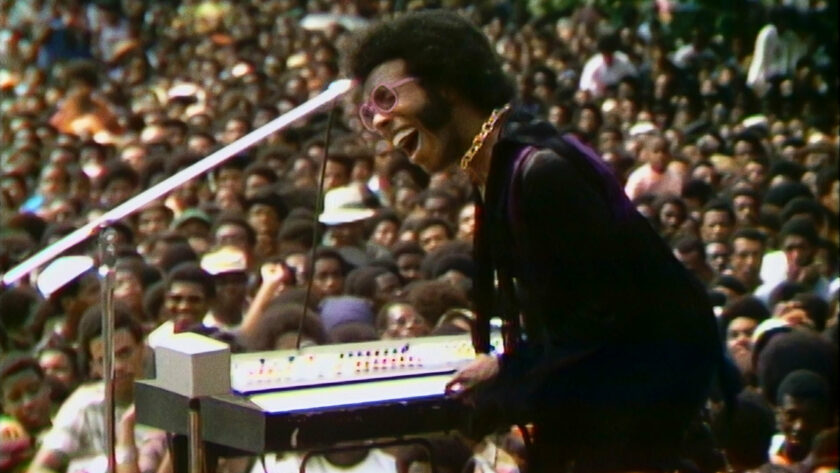Ellie Lachs hails Questlove’s directorial debut and Sundance success Summer of Soul.
In 1969, The Harlem Cultural Festival took over Mount Morris Park. It was a history-making, soul-shaking, one-time-only event, brimming with Gospel, Blues, Soul, and Jazz. Gracing the stage in block coloured suits, bell bottomed trousers, and tunics, the festival hosted all the greats. From Mahalia Jackson, to Sly and the Family Stone, to Nina Simone, to Stevie Wonder, BB king, Max Roach, Abbey Lincoln, Hugh Masekela, Mongo Santamaria, Gladys Knight and the Pips, Babatunde Olatunji, and David Ruffin.
It was spread over six weeks, and saw a total of 500,000 attendees. Thousands filled the open space, dancing on the grass, singing from up in the trees, rain or shine. It was a revolutionary event and a celebration of Black American culture like no other. And yet, this festival went almost entirely under the radar. Woodstock happened in the same year and dominated media coverage, despite its comparatively pithy three-day run.
In this debut film, Summer of Soul (…Or, When the Revolution Could Not Be Televised), Amir ‘Questlove’ Thompson unearths the footage from this festival, weaving together a collection of the performances with anecdotes and commentaries from the surviving performers and audience members. He ties these together with vital moments of Black American history; notably the murders of Malcom X and Dr Martin Luther King, as well as the 1968 riots which were led by the likes of Stockely Carmicheal. Questlove layers the footage surrounding these events with the footage and the music from the festival. All of this is sequenced with an exquisite amount of precision, drawing on all the different aspects of Black musical tradition, and with each different genre we get a sharp and enriching pocket of history, which is ordered in a largely chronological fashion.
Where Mahalia Jackson breaks down in tears during her performance of Dr. Martin Luther King’s favourite song — ‘Preacher Guide the Way’ — she ends up sharing the mic with Mavis Staple in a jaw dropping performance which is accompanied by a stark and moving eulogy of MLK by the Rev. Jesse Jackson, who witnessed his murder the summer prior to the festival. In this moment, we see how much grief, hope, and anger the music really holds.
The film is an homage to and celebration of Black beauty, Black American culture, and Black music. It is an utterly illuminating masterpiece and the music hits like no other. These performances are some of the best you’ll see, and the audience alone is testimony to that. As attendee Musa Jackson noted, this film proves that the festival really did happen as he had remembered it. “[He knew] he was not crazy, but now [he] knows [he’s] not crazy”. The film is a confirmation of how “beautiful [the festival] really was”. When the footage was buried, all that was left were memories, but now it’s out in the open and everyone can witness the magic of the summer of ’69 in Harlem city.
Whilst the film is punctuated by deeply moving moments, it is also saturated with joy, celebration, warmth and laughter. Summer of Soul is filled with funny and witty anecdotes that, if it’s possible, breathe even more life into the music. As one of the attendees recalls: “Sly and Family Stone would sort of saunter out, their instruments weren’t tuned, they weren’t wearing suits like we were used to with soul bands, and the drummer was a white guy! Not to mention the gender parity… but when the music started, that was it, music was the common denominator.”
The burying of this event was a devastating erasure of Black history, but the footage remains, now wrapped so brilliantly in Questlove’s genius, and we can only hope that the stories and memories of the Harlem Cultural Festival will live long and hard, and make up for all their lost time.




